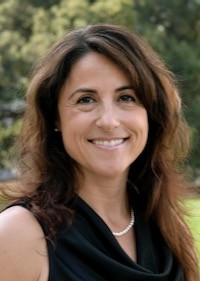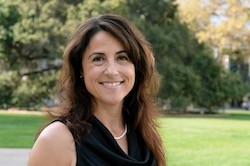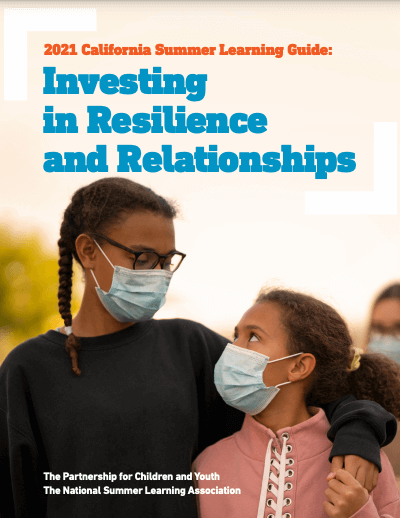Summer Learning, Not Summer School

At last, Summer Learning is a hot topic
Summer is a hot topic right now. Leaders at every level of the system are talking about summer as a critical time to help students, especially the most vulnerable, recover from a year of COVID and all the challenges that have come with that. They talk about summer as a time to catch up on lost learning, get social and emotional supports, and prepare students for the next school year.
Summer has never been treated as a priority by policy leaders to a significant degree – until now.
 Guest Comment
Guest CommentJennifer Peck
All of this makes sense and must be done — and is also not unique to the year of COVID. Summer has always been a consequential time for learning and development. It's a time to build academic skills, to build relationships with peers and adults, and to gain experiences and exposure that benefit students. But summer has never been treated as a priority by policy leaders to a significant degree — until now. So what do we do with this moment?
For the most part, quality summer learning experiences have been limited to students whose families can afford camps, vacations, and other opportunities to learn and grow. Students from low-income families and many students of color have been denied these experiences, making summer a big and persistent contributor to both the achievement and opportunity gaps. Plenty of research documents the phenomenon of summer learning loss, and the missed opportunity it represents. Summer learning can provide opportunities for access to social capital, development of critical social and emotional skills, building of literacy skills and also language development for English learners.
Yet year after year, decade after decade we have failed to find solutions to the inequities caused by our school calendar, which mistakenly presumes that learning only happens from September through June, and that the three-month summer break is of no consequence to educational outcomes. This couldn’t be further from the truth.
New Investments in Summer Learning
For the next two to three years, state and federal investments will allow us to really do something for students in the summer, with a focus on students who have been left out of the summer learning picture in the past. There are some key things that educators and system leaders must consider and prioritize if we are to use these resources wisely:
Summer Learning, Not Summer School.
Shift the frame from "summer school" to summer learning. These terms have very different connotations. Summer school is a strategy of the past — it was remedial, punitive, and didn’t prove to lead to different outcomes for students. Summer learning, by contrast, is what more advantaged students get to do as a matter of course, and what has protected those students from devastating learning losses. Summer learning — with skill building, opportunities to broaden horizons and learn in different ways and have fun - is what all students need and deserve.
Don’t reinvent the wheel.
Years of summer quality research have shown what it takes to advance academic and well-being outcomes for students, such as full-day programs that are designed like camp, using a mix of teachers and community-based educators, and weaving in lots of enrichment and fun so that kids get excited about the program and attend consistently. There are many models, tools and ideas, both here in California and beyond.
Don’t go it alone.
As referenced above, partnerships between schools and community-based organizations (CBOs) are a key ingredient to quality summer experiences for students. CBO staff are real experts at the fun and enrichment that are so critical, and are enormous assets when it comes to relationship building and connections with students and their families. Especially this summer when there may be a shortage of educators willing to work in summer programs, we must think creatively about partners like higher ed, libraries, affordable housing sites and others who have summer enrichment expertise and capacity to bring to the table.
Create a year-round, multi-year strategy.
Districts should map out a plan that involves at least two or three summers, with plans to innovate, learn and improve over time. They should also weave their work into a year-round learning approach, with summer as a critical bridge during which we can provide students with different experiences that reinforce learning and expose them to people and experiences that prepare them for their futures.
Finally, a word to state-level policymakers.
This is a rare moment when you get to deliver the level of resource schools really need. It’s temporary — but it doesn’t have to be. Let’s take a close look at what we are gaining through these investments and think ahead about what must be sustained beyond one-time infusions of funding. Summer has been a glaring gap for decades — don’t end up ripping the rug out from under students and families who badly need our education system to finally consider learning a year-round endeavor.
 Jennifer Peck is President & CEO of the Partnership for Children and Youth (PCY), a statewide intermediary that strategically links practice and policy to improve educational opportunities for underserved youth in California. Since founding the organization 20 years ago, Jennifer has played a leading role in building California’s system of afterschool and summer programs, which serves nearly a million students every year.
Jennifer Peck is President & CEO of the Partnership for Children and Youth (PCY), a statewide intermediary that strategically links practice and policy to improve educational opportunities for underserved youth in California. Since founding the organization 20 years ago, Jennifer has played a leading role in building California’s system of afterschool and summer programs, which serves nearly a million students every year. Tags on this post
Equity SummerAll Tags
A-G requirements Absences Accountability Accreditation Achievement gap Administrators After school Algebra API Arts Assessment At-risk students Attendance Beacon links Bilingual education Bonds Brain Brown Act Budgets Bullying Burbank Business Career Carol Dweck Categorical funds Catholic schools Certification CHAMP Change Character Education Chart Charter schools Civics Class size CMOs Collective bargaining College Common core Community schools Contest Continuous Improvement Cost of education Counselors Creativity Crossword CSBA CTA Dashboard Data Dialogue District boundaries Districts Diversity Drawing DREAM Act Dyslexia EACH Early childhood Economic growth EdPrezi EdSource EdTech Education foundations Effort Election English learners Equity ESSA Ethnic studies Ethnic studies Evaluation rubric Expanded Learning Facilities Fake News Federal Federal policy Funding Gifted Graduation rates Grit Health Help Wanted History Home schools Homeless students Homework Hours of opportunity Humanities Independence Day Indignation Infrastructure Initiatives International Jargon Khan Academy Kindergarten LCAP LCFF Leaderboard Leadership Learning Litigation Lobbyists Local control Local funding Local governance Lottery Magnet schools Map Math Media Mental Health Mindfulness Mindset Myth Myths NAEP National comparisons NCLB Nutrition Pandemic Parcel taxes Parent Engagement Parent Leader Guide Parents peanut butter Pedagogy Pensions personalized Philanthropy PISA Planning Policy Politics population Poverty Preschool Prezi Private schools Prize Project-based learning Prop 13 Prop 98 Property taxes PTA Purpose of education puzzle Quality Race Rating Schools Reading Recruiting teachers Reform Religious education Religious schools Research Retaining teachers Rigor School board School choice School Climate School Closures Science Serrano vs Priest Sex Ed Site Map Sleep Social-emotional learning Song Special ed Spending SPSA Standards Strike STRS Student motivation Student voice Success Suicide Summer Superintendent Suspensions Talent Teacher pay Teacher shortage Teachers Technology Technology in education Template Test scores Tests Time in school Time on task Trump Undocumented Unions Universal education Vaccination Values Vaping Video Volunteering Volunteers Vote Vouchers Winners Year in ReviewSharing is caring!
Password Reset
Search all lesson and blog content here.
Login with Email
We will send your Login Link to your email
address. Click on the link and you will be
logged into Ed100. No more passwords to
remember!















Questions & Comments
To comment or reply, please sign in .